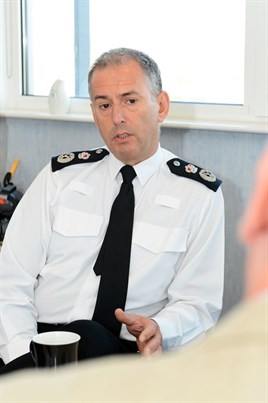"If the railway is not safe, secure and reliable, then the Government’s investment of billions of pounds is pointless. We are at the centre of that.”
Chief Constable Paul Crowther, who has worked his way up from a British Transport Police constable over the past 34 years, sets out his stall. BTP has been his entire working life. His challenge since taking over the top job from Andy Trotter in May has been to make the world’s only national railway police force fully fit for purpose in a changing climate.
Crime has reduced on the railway for the tenth successive year. The rate for the most serious offences dropped by a further 6% in 2013-14, equating to 3,000 fewer crimes than the year before.
But the overall downward trend masks some serious issues. The number of sexual crimes committed rose sharply. The number of complaints against the police rose. Critically for train operators, the delays due to crime also rose. And those increases are set against a backdrop of cost-cutting and staff re-organisation.
So the Chief Constable sits down for a detailed discussion about his force’s challenges - the areas that must change if the BTP is to play its full part in the industry’s drive for efficiency, for fewer delays, and for costs to be kept under control.
BTP’s nondescript and uninspiring offices are in Camden in North London, beside a local branch of Sainsbury’s. Although tracks can be seen at a distance from the top floor windows, it is not an obvious location for a railway headquarters. “It’s cheap,” Crowther explains. “And we’ve just signed a new ten-year lease.”
He is five months into his five-year contract to lead the force. He gives lengthy, clear and thoughtful answers to questions, refreshingly free of glib media soundbites. Unusually for a senior officer, his comments are generally also devoid of police-speak, the inexplicably complex jargon-filled formal language that is often ingrained from the first days of form-filling out on the beat.
Perhaps that is because Crowther has become accomplished at justifying his decisions. Policemen have to answer to their Police and Crime Commissioner and to the Home Office. But BTP officers also have to explain themselves to the Transport Select Committee, Department for Transport and to the industry that pays the bills - and the latter needs to see what it is getting for its money. He gets plenty of practice at this.
“Every year we carry out a detailed assessment of the policing challenges ahead. We looked at crime rates, at social and demographic changes, and we looked at the growth in passenger numbers.
“We looked at the way we were configured to meet those challenges. We needed to restructure. By reducing support infrastructure and management layers, we could release resources and budgets. We mirrored the industry’s geographical structure as best we could, so that individual train operators only deal with one part of BTP. That is similar to the way local police forces have relations with their local authorities.
“We are also doing a lot of work with the franchising team at the Department for Transport, under Peter Wilkinson. We are working on future franchising agreements so that we are aligned with the needs of the railway.”
BTP expects demands for its services to increase in line with a predicted rise in passenger numbers of 16%-20% by 2019.
It has cut 120 back-office staff. There are 36 fewer senior officers. Seven separate policing areas around the country have been reduced to three divisions. The £9 million saved has been reinvested in more frontline staff - an additional 208 officers.
BTP now has 2,931 officers and 1,853 other staff, including community support officers (PCSOs.) Its budget for the current year is £258m. Of that £205m is for main line policing and £53m is for London Underground.
“Each of the seven geographic areas used to be semi-autonomous, each with its own structure for intelligence, prosecutions, criminal justice,” Crowther explains.
“If you corral those back-office functions into bigger units, you deliver broadly the same service at cheaper cost, and arguably more efficiently and effectively.
“We think that means we can achieve a further 20% reduction in crime, a further 20% reduction in disruption caused by crime, and a further 10% improvement in passenger confidence.”
London-centric
The result is a force undeniably focused on London. Almost two-thirds of the staff are based there. Two-thirds of the money is spent there. And Crowther himself has spent his whole working life in the capital.
“It reflects where the demand is,” he says. “Sixty per cent of rail crime is in the South East. More than 60% of passenger journeys are in this area.”
Measured by the number of incidents per passenger, London Underground is more than three times safer than the main line network. There are 25 crimes per million passengers on the national rail network, and only eight crimes per million passengers on London Underground. Is that simply because BTP has concentrated its efforts in the capital?












